

Most ebook files are in PDF format, so you can easily read them using various software such as Foxit Reader or directly on the Google Chrome browser.
Some ebook files are released by publishers in other formats such as .awz, .mobi, .epub, .fb2, etc. You may need to install specific software to read these formats on mobile/PC, such as Calibre.
Please read the tutorial at this link: https://ebookbell.com/faq
We offer FREE conversion to the popular formats you request; however, this may take some time. Therefore, right after payment, please email us, and we will try to provide the service as quickly as possible.
For some exceptional file formats or broken links (if any), please refrain from opening any disputes. Instead, email us first, and we will try to assist within a maximum of 6 hours.
EbookBell Team

0.0
0 reviewsThis work is concerned with appraising the contemporary ethical impact of lifelong learning ideology and advocacy on education, through focusing on trends in educational policy and management that flow from the ideology. It has its origins in the author's concern that many of those trends are being defmed and promoted, or opposed, without an adequate understanding of their ethical dimensions. The 21 trends examined in this work are seen as defming important dimensions of the quite radical changes in educational policy and management that are flowing from the practical realisation of lifelong learning ideology and advocacy. In here evaluating those trends from an ethical perspective, the thesis is developed that they lead inevitably to distinctive ethical dilemmas or tensions in the lived experience of educational participants. The dilemmas, though, are not seen as realities that can intelligently be either avoided or resolved. They are, rather, inescapable features of the trends, although they and the experience of them may be managed intelligently to a greater or lesser extent. This analysis is premised on the belief that an understanding of the dilemmas may be of practical value in assisting educators, and policy makers and managers, to live and work more intelligently with them and to better manage the educational changes that are defmed by the trends. It may thereby contribute to moderating the excesses, sillinesses, and inanities so often evident in the directing and managing of refonns associated with the trends and to reduce the anguish and pain associated with them.